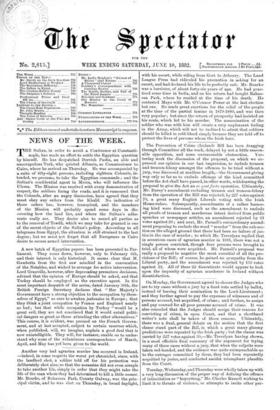The Prevention of Crime (Ireland) Bill has been dragging through
Committee all the week, delayed by not a little reason- able opposition, and some unreasonable obstruction. Yes- terday week the discussion of the proposal, on which we ex- pressed our opinion in our last impression, to include treason and treason-felony amongst the offences to be tried without a jury, was discussed at needless length,—the Government giving way only so far as to exclude offences of the kind committed before the Act shall have passed, in otter words, withdrawing the proposal to give the Act an et post facto operation. Ultimately, Mr. Davey's amendment excluding treason and treason-felony from the operation of the Bill was rejected, by 227 votes against 70, a great many English Liberals voting with the Irish Home-rulers. Subsequently, amendments of a rather harass- ing kind were discussed, such as the amendment to exclude all proofs of treason and murderous intent derived from public speeches or newspaper articles, an amendment rejected by 61 votes against 26; and next, Mr. Parnell's extraordinary amend- ment proposing to exclude the word " murder " from the sub-sec- tion on the alleged ground that there had been no failure of jus- tice in the case of murder ; to which Mr. Trevelyan replied that in seventeen cases of agrarian murder in 1881, there was not a single person convicted, though four persons were brought to trial, all of whom were acquitted. Mr. Parnell's proposal was really a proposal to negative the most essential of all the pro- visions of the Bill ; of course, he gained no sympathy from the Liberal party, and the amendment was rejected by 133 votes against 22. All of these 22 dissentients would appear to look upon the impunity of agrarian murderers in Ireland without dissatisfaction.




































